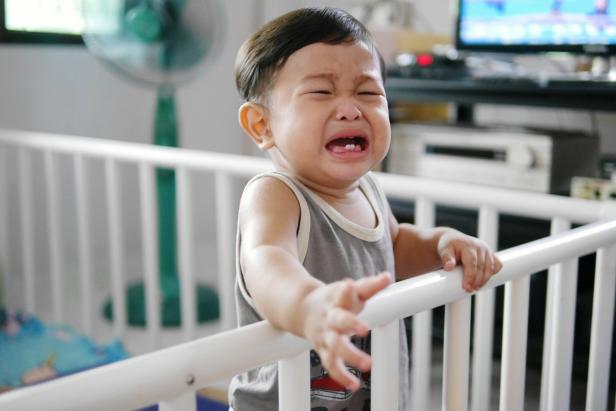Opinion: Why the Cry-It-Out Method Has Zero Benefits
Let's bust this parenting myth.


Pakorn Phantaneeya / EyeEm
Every parent, at one point or another, is told to let their baby cry-it-out. This popular practice started in the early 1900s, when people thought too much love would result in an unfit, spoiled human being. However, there have been no studies proving any benefits to letting a baby cry-it-out.
In fact, more and more research is shows that “letting babies get distressed is a practice that can harm children and their relational capacities in the long term.” The research also suggests that babies whose cries weren’t ignored became more independent adults. When parents respond to their babies, they are instilling self-confidence in their child—an important trait we should all develop.
Here are four reasons why you should avoid letting your baby cry-it-out:
Babies Cry to Communicate
Crying is the only form of communication a baby knows. And babies, just like you, have feelings of fear, isolation and insecurity. Many times, parents are led to believe that if a baby is fed, healthy and has a clean diaper, there is no reason for a baby to cry. But how many times have you gotten upset over things that have nothing to do with being clean and fed?
Babies are trying to understand this world and it can be a scary place for them at first. Many times, they cry because they need comfort and safety from someone who loves them. Even when we can’t understand why they are crying, there is always a reason. You don’t have to understand what the reason is; all you have to do is acknowledge it and let your baby know that their voice does matter.
Stress Hinders the Development of Fast-Growing Brains
When a baby is crying, their body goes into a stressed state and the hormone cortisol is released. Harvard research discovered that “sustained activation of the stress response system can lead to impairments in learning, memory and the ability to regulate certain stress responses.”
Self-Regulation and Self-Soothing Are Learned Through Comfort
Some wrongly believe that letting a baby cry-it-out can help them learn how to self-regulate, which is an important skill that all humans need in life. However, babies cannot comfort themselves on their own.
When a child is picked up, they are able to calm down in the presence of their caregiver. The experience of being soothed is teaching a baby what soothing and calmness feels like, which helps them to develop self-comfort as they age.
The Development of Self-Confidence Starts with Babies
When babies are left to cry, they may lose trust in their caregivers and this might create an adult who spends their life trying to fill an empty void in themselves. When parents respond to a baby’s cry, they are building their child’s trust in them and in human relationships—this is the base of self-confidence.
Every family is different. If you’re struggling to find the best parenting methods, seek help and talk to your partner, friends or family.















